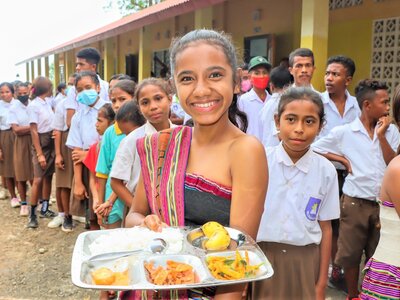Timor-Leste
- 27%
- of people are acutely food insecure
- 47%
- of children under 5 are stunted
- 1.3 million
- population
Although Timor-Leste has made significant progress since gaining independence in 2002, this Small Island Developing State is confronted by challenges including poverty, food security and malnutrition.
The agricultural sector is critical for livelihoods, employing about 70 percent of the population, yet remains largely subsistence-based with limited market access. Agricultural productivity is low.
Mountainous terrains and unpredictable climate-related shocks – including droughts, floods and irregular rainfall – exacerbate food-production issues. Reliance on imports for over 60 percent of its food supply makes households additionally susceptible to both domestic supply chain disruptions and price fluctuations.
What the World Food Programme is doing in Timor Leste
-
Nutrition
-
WFP supports the Government in achieving national nutrition targets by enabling year-round access to diverse and nutritious diets, particularly for groups with higher nutrient needs, such as young children, adolescent girls, and pregnant and nursing mothers, with a particular emphasis on the first 1,000-days from pregnancy to a child's second birthday. To assist vulnerable families, WFP facilitates access to fortified foods rich in essential vitamins and minerals.
-
Social and Behaviour Change Communication
-
WFP promotes healthy diets through a range of activities. These include Nutrition School Education Clubs and training for teachers, health workers, school management committees and school staff, including cooks. WFP also contributes to LAFAEK – a youth-focused magazine featuring nutrition content which reaches over 206,000 school-aged children nationwide.
-
Food security
-
WFP works with ministries to produce reports that inform decision-making on food security. Additionally, WFP participates in national food security and nutrition forums, working to strengthen the capacities of national and subnational institutions.
-
School meals
-
WFP supports the Government’s National School Meals Programme across all municipalities. With donor support, focus is given to Baucau, Bobonaro and Manufahi municipalities, benefiting over 68,000 children in 400 schools. Efforts include building school kitchens, distributing kitchen utensils and building the capacity of school cooks and school meal committees. To enhance the programme, WFP partnered with four ministries to develop a recipe book featuring over 130 recipes tailored to the 13 municipalities. The recipes use locally available ingredients, promoting agriculture and supporting the economy.
-
Logistics
-
WFP works to improve the efficiency of supply chain processes and systems. Where required, WFP complements the Government’s logistics capacities by providing supply chain services and technical advice. By using its expertise in humanitarian logistics and strengthening partnerships with government entities, NGOs, the private sector and other stakeholders, WFP is supporting the Government in institutionalizing best practices in logistics and core supply chain management skills.
-
Emergency preparedness and response
-
Given the country’s susceptibility to various shocks (especially climate related), WFP, in partnership with the Government, is conducting training, coordinating joint needs assessments and convening technical working groups, among other activities, to reduce the impact of disasters on vulnerable communities. WFP continues to work with the Civil Protection Authority and other partners to improve contingency planning, enhance emergency preparedness and support the prepositioning or delivery of humanitarian assistance.
Timor-Leste news releases
Go to pagePartners and donors
Find out more about the state of food security in Timor-Leste
Visit the food security analysis pageOperations in Timor-Leste
Contacts
Office
Colmera, Vera-Cruz, Av. Presidente Nicolau Lobato, Edificio SAPT, Páteo Square
Dili
Timor-Leste







